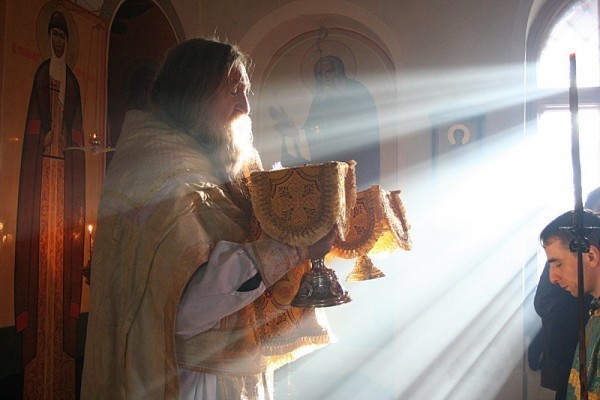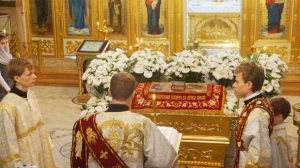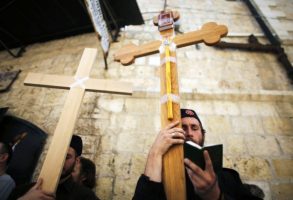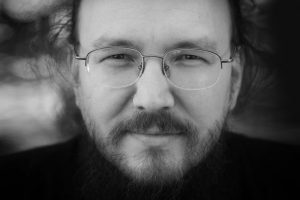On Great Thursday we remember the Last Supper which our Lord Jesus Christ had with His disciples before being betrayed to suffer death on the cross. Holy Thursday liturgy is filled with many images and texts that remind us of all the major events of the salvation of the human race — from the creation of the world and flesh, the coming of our Lord and Savior Jesus Christ, the Lord’s Supper, and His suffering and death on the Cross.
At Vespers, which begins with the Liturgy of St. Basil the Great, we heard from Exodus how God told Moses to ascend Mount Sinai to present himself and how the people waited for him to come down from the mountain in fear and with trembling — and when he came down from the mountain they heard thunder and lightning. Only Moses was allowed to commune with God face to face (see. Ex. 19: 3-25).
This is one of many Old Testament prophecies of the event that we commemorate today, and of which the following liturgical texts speak: “Come, O ye faithful, with uplifted minds, let us enjoy the hospitality of the Master, and the immortal banquet in the upper chamber,” that is to say: “The hospitality of the Lord, ascending to a high place and delighting all the faithful with uplifted minds.” Where is the highest point? Where is the highest mountain that elevates us to the Lord Jesus Christ? This is not Mount Sinai, where God spoke to Moses, but the temple of God, in which the Mystery of the Eucharist is performed. In order to be worthy partakers of the great Mystery, we must ascend this mountain and talk to God “with uplifted minds.” Like Moses, we need to clean our eyes and our heart in order to proceed to the Mystery of the Eucharist. The entire period of the Great Fast served to purify us as we abstained from certain sorts of food, tried to refrain from evil, and monitored our lives more closely.
It is no coincidence that during the Great Fast, the Church in some cases refrains from the Eucharist. Complete Eucharist is not served during the Great Fast except on Saturdays and Sundays. On Wednesdays and Fridays a special evening Liturgy of Presanctified Gifts is performed. On some days the Church, at least temporarily, closes access to the highest mountain on which we can communicate with the Lord with “with uplifted minds.” This is done so that we realize our sinfulness, repent for all our evil deeds, and to better prepare us for this great Sacrament. The Sacrament of the Eucharist (except for Great Lent) takes place in the Church every day, and whenever the Eucharist is served, we are invited to be participants and partakers. We must remember that every time, during Liturgy, we hear the words of Christ spoken by a priest or bishop: “Take, eat: this is my body … Drink ye all of it: This is My Blood of the new testament, which is shed for you and for many, for the remission of sins” — every time we see the priest coming with the Cup, and hear: “With fear of God and faith, draw near” — these words are addressed to each of us.
Every time Liturgy is served, when the Eucharist is performed, God calls us “with uplifted minds” to ascend the mountain and commune with Him not as Moses — in fear and trembling — but to connect with God spiritually and physically through the Sacrament of the Eucharist.
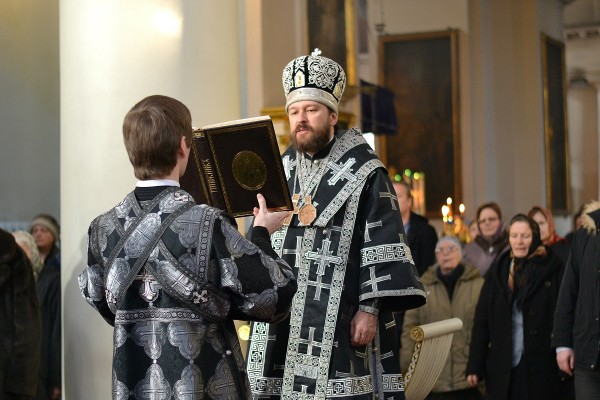 The Church keeps us from participating in this sacrament only for a few days during Great Lent in order that we may come to repentance.
The Church keeps us from participating in this sacrament only for a few days during Great Lent in order that we may come to repentance.
The Lord calls us to be partakers of the Lord’s Supper, whenever we want. Praying, “Give us this day our daily bread,” we not only ask about material bread — not only about food, which we use to continue our life — but also about Heavenly Bread, which is the Lord Himself. Christ said that a man may eat of this bread and not die, for he who eats this bread, according to the word of the Lord, “abides in me, and I in him” (John 6:56).
The person who has received the Holy Mysteries of Christ is united with God spiritually and physically. The distance that exists between us and God, and that no human feat, no effort, no human holiness is able to overcome, was overcome by God Himself when He became man and came to this earth.
The Lord came to live in us and to make us a royal priesthood and holy nation belonging to God (see. 1 Peter 2: 9). Just as the Old Testament priests were anointed, we too have all been anointed as a seal of the Holy Spirit’s gift. We should participate in the Eucharist as much as possible, according to our strength and capabilities, so that we are not just a royal priesthood in name. Only our sinfulness, only our human weakness, only our infirmity prevents us from participating in the Eucharist every day, but God always gives us access to this holy mountain.
Now, when we approach the Holy Chalice, we ask the Lord to make us participants in His Last Supper so that we never become traitors like Judas, and so that partaking of the Holy Mysteries is for all of us — not in judgment or condemnation, but eternal life and immortality. Amen.
Translated from the Russian.












